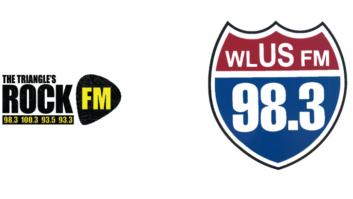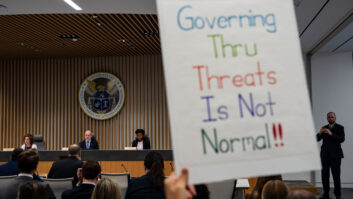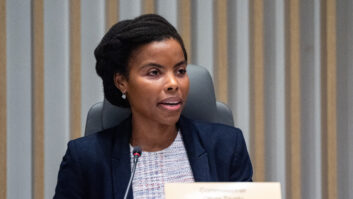The FCC has ordered an FM translator in North Carolina to go silent until it can implement a solution to prevent interference with full-power station 98.3 WLUS(FM) in Virginia.
Radio World previously reported on the original interference complaint filed by Tom Birch, president of Lakes Media LLC, which owns WLUS.
The translator in question, 98.3 W252EL(FM), is licensed to Cary, N.C., and owned by First State Communications. It rebroadcasts 570 WQDR(AM), which airs a rock format as “The Triangle’s Rock FM.”
WLUS is a Class C3 FM licensed to Clarksville, Va., with a tower located just across the state line in North Carolina, along U.S. Highway 15 in Granville County. It runs a country format as “US 98.3.” WLUS’ tower is approximately 49 miles from W252EL’s transmitter site.

Lakes Media’s original complaint said co-channel interference from the translator occurred along WLUS’ southern 45 dBu contour.
Listener complaints and FCC deadline
According to the FCC’s summary of the events, WLUS gathered eight “rule-compliant” listener complaints from communities in northern North Carolina, including Franklinton, Youngsville, Wake Forest, Creedmoor and areas along Interstate 85.
In November, the commission sent a remediation letter to First State, requiring it to either submit a plan to address the interference or formally dispute the complaint. Sixty days after filing a plan, the broadcaster was required to submit evidence that the interference had been resolved.
First State submitted its plan in December, stating it would work with listener complainants to resolve the issue. In the FCC’s account, First State said Birch presented three options to resolve the matter:
-
First State could purchase WLUS outright from Lakes Media for $1.5 million.
-
It could pay Lakes Media $500,000 to withdraw the FCC complaint and allow the interference to continue.
-
It could modify the translator’s facilities to eliminate overlap with WLUS’ 45 dBu contour.
First State chose option three, according to the commission’s account. It hired independent engineer Gary Hattaway to conduct interference testing in late January at each of the eight locations.
Hattaway found mild to severe interference at all sites.
On Feb. 10, First State filed a report including those results and pledged to install a PSI FMY-1 directional antenna at 150 watts ERP to eliminate the interference.

Lakes Media responded in opposition, stating: “For nearly six months, WLUS has suffered egregious interference from W252EL within its protected contour.” The company argued that First State had done nothing to eliminate the interference and that its plan was invalid, lacking technical details about the directional pattern. It added that even if the modification were granted, implementation would take “months.”
Translator’s proposed fix and regulatory response
First State officially filed for the antenna modification on Feb. 12. Lakes Media again opposed the move, according to the FCC’s account, saying there was no concrete evidence that the directional pattern would resolve the problem and that First State also needed to demonstrate protection of the station the translator relays, WQDR(AM).
In a subsequent reply, Lakes Media reiterated that the translator should be ordered off the air and that the modification should be denied unless tied to proof of performance.
The Media Bureau found that First State had not acted in a timely manner. It noted that the company failed to resolve the interference by the Feb. 10 deadline and only filed the modification two days later. However, the FCC did find the directional pattern proposal satisfactory. It disagreed with Lakes Media’s claim that the submission was inadequate, concluding that the proposed change complies with its rules and would resolve the interference.
Still, because the interference to WLUS persisted under the translator’s current facilities, the FCC ordered W252EL to cease operations until the interference reported by the eight listener complainants has been resolved.
The commission denied Lakes’ request to condition the modification grant on a required on/off interference test. Instead, First State must submit its measured directional pattern when it files a covering license to resume operations.
First State filed for special temporary authority to go silent on Friday, in accordance with the Media Bureau’s order. It acknowledged the translator will remain off the air pending FCC authorization to resume broadcasting.







